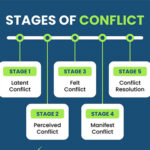Conflict refers to a clash or disagreement between individuals or groups, typically the opposite of cooperation. Its manifestations can range from mild tensions to intense confrontations. Conflicts can arise from various sources such as personal differences, working conditions, wage or power relations, organizational issues, or technological changes.
Types of Conflict
-
Approach-Approach Conflict
This occurs when an individual faces a choice between two equally attractive options, such as two well-paid job positions, but can only choose one. -
Avoidance-Avoidance Conflict
In this situation, an individual or company must choose between two unfavorable outcomes, for example, deciding whether to lay off staff or forgo profits. -
Avoidance-Approach Conflict
This conflict arises when an individual is faced with a decision that has both negative and positive aspects, such as taking on shift work for a higher salary, but with the downside of less desirable working hours.
Conflict Management
Effective conflict management is crucial to prevent conflicts from escalating. The following principles should be followed to ensure conflicts are resolved constructively:
-
Control Arousal: Stay calm and avoid being provoked.
-
Build Trust: Acknowledge personal mistakes and be open to collaborative problem-solving.
-
Maintain Open Communication: Be approachable and open during discussions.
-
Resolve the Conflict: Work toward a solution that allows all parties to live and work with the agreed outcome.
A conflict is considered resolved when the involved individuals or groups can coexist with the agreement reached.
« Back to Glossary Index





![15 Employee Offboarding Templates That Save Hours of HR Time [Free Downloads] 15 Employee Offboarding Templates That Save Hours of HR Time [Free Downloads]](https://i1.wp.com/www.hrcloud.com/hubfs/Header.png?w=150&resize=150,100&ssl=1)
